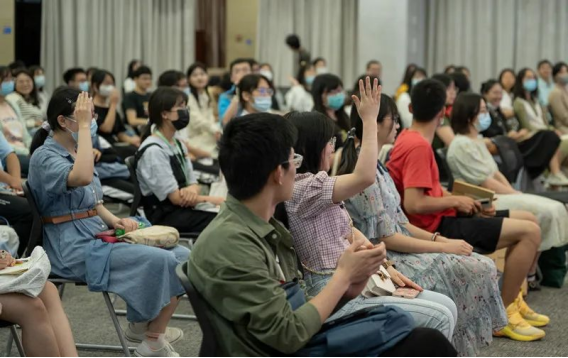With the arrival of the summer, Wuhan University campus took on a fresh appearance, presenting a landscape of beauty and vitality. On the evening of May 8, right after the Beginning of Summer, a special living library activity themed “Invisible Landscapes” was held in the WHU Main Library. Prof. Zhang Jianfei, from the College of Chinese Language and Literature, and Prof. Du Runlei, from the College of Life Sciences, attended the activity and shared their reflection and insights on nature, landscape and life.

The 69th Living Library at WHU
When it comes to landscape, nature and life are two inseparable elements. While Prof. Du turned her research from molecules to individuals and groups, deepening her understanding of nature and life in the domain of biology, Prof. Zhang was attracted by the plant scape in the English Lake District, deciding spontaneously to combine botany and literature. Their specialties cast light on landscape research, which itself is a field comprising mysterious and multi-dimensional landscapes.
At the beginning of the activity, Prof. Du led students into a reflection on the routines they go through from dormitory to teaching buildings, posing two questions, “Can you describe the landscape along the way? Dare you claim that you are familiar with the environment around you?” Unexpectedly, the only response was silence. Under interrogation, the seemingly familiar environment around us appears to be strange. To explain this phenomenon, Prof. Zhang referred to the concept of “environmental perception”. For students growing up in an artificial environment, the main means to perceive nature and the landscape would be through electronic screens, causing the absence of environmental perception. The best approach to improve the situation, suggested by Prof. Du, was to build a connection between people’s real life and themselves, starting with the environment around us. In essence, the moment of capturing landscapes is the moment of building connections with nature.

Prof. Du sharing personal insights
There is no doubt that landscape appreciation plays an important role in experience. However, it is impossible to reach an agreement on one best landscape for all people. For Prof. Du, the most impactful scenery comes down to wasteland. Her experience as a small person facing nature during childhood while standing in a wasteland just before a storm evoked a feeling of despair and shock, which had a profound influence on her life. Whenever she reads descriptions of wasteland by either Hardy or Eliot, she tends to create an emotional bond with the letters. “Beauty in different people’s eyes differs,” concluded Prof. Zhang. The difference in preference for landscape, she added, was only a matter of aesthetic preference and not one of superiority or inferiority. It is of no necessity to adhere to the widely-recognized beauty but to seek the unique beauty of one’s own taste.
Stimulated by the introduction and analyses of landscape, readers put forward several questions related to the topic. The two guests offered their interpretations of the questions from the perspective of literature and life sciences, which brought the discussion to a deeper level.

Readers raising questions
Speaking of the importance of landscape in literature, Prof. Zhang shared her answers from an academic viewpoint. As landscape could be abstracted as a setting, its significance lays both in one of the three essential elements of novels and the dominant role in deciding the fate of characters. Besides, there has been abundant academic research on this topic. However, the definition of landscape depends on its study subject. Whether it is the smell-scape in In Search of Lost Time, the cityscape in Invisible Cities, or the waterscape, cloudscape, or moonscape in other literary works, they are all in the domain of landscape. In this manner, landscape could be recognized as a way of perception. For Prof. Zhang, landscape stands as a synonym for the world. Therefore, people live both in and under the landscape.

Prof. Zhang talking about landscape and literature
In light of the relationship between humans and nature, Prof. Du provided her insights into the issue from a life sciences perspective. “While it is obvious that research on nature contributes to human interest, the dilemma is inevitable if research were done with the purpose of conquering nature.” Although human intelligence is limitless, she insisted that it should never be restricted in a vulgar way.
With the activity coming to an end, the relationship between visible and invisible landscapes was explored. While their main difference seemingly lies in the manner of visuality, visuality is also the consequence of brain processing. It is the invisible landscape that determines the visible landscape. For instance, the exploration of what had happened from visibility to invisibility could spark scientific curiosity. Even though the 69th Living Library has ended, lessons from it remain permanently. Through the exploration of the surrounding visible and invisible landscapes and beyond, people will discover a personal landscape of the soul, approaching the ultimate beauty step by step.
Talking with great people is like reading a good book. The Micro Heaven Living Library, held by the WHU Library and WHU Micro Reading Association, aims to invite excellent people with abundant experiences to share stories and reflections from which readers might acquire spiritual sustenance. Since the first event hosted on December 17, 2012, 69 Living Library activities have been held, and 156 living books have been launched, influencing over 10,000 readers.
Photo by the Official Account of WHU Library
Edited by Li Jing, Sylvia, Xi Bingqing